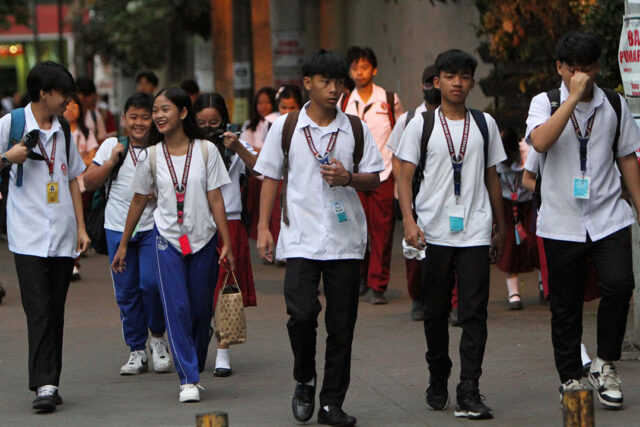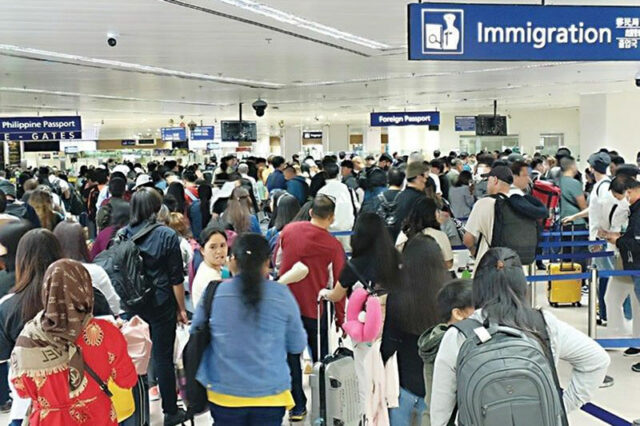By Kyle Aristophere T. Atienza, Reporter
JAPAN on Monday vowed to boost ties with the Philippines, the United States and Australia to keep the Indo-Pacific region open and free, a day after the four nations held war games in the South China Sea where China has shown growing assertiveness.
In a statement, the Japanese embassy in Manila said Tokyo would “seize every opportunity to strengthen its partnership with the Philippines, the US and Australia in ensuring regional peace and stability.”
“The Japan Maritime Self-Defense Forces will also continue to operate and exercise freedom of navigation in realizing a free and open Indo-Pacific,” it added.
The Philippines, US, Japan and Australia on Sunday held joint military drills within Manila’s exclusive economic zone in the South China Sea using their naval and air force units.
They performed a communication exercise, division tactics and a photo exercise, the Armed Forces of the Philippines said in a statement.
Japan, with an over $4-trillion economy, has likely veered away from its post-war foreign policy of not using its military to protect its interests, said Joshua Bernard B. Espeña, vice-president at the Manila-based International Development and Security Cooperation.
“While its military will not be the main tool of such policy, it has now adjusted to the new strategic realities of the 21st century,” he said in a Facebook Messenger chat. “It also means regaining the lost art of fighting a conventional war at sea, but this time, with its former foes.”
Philippine Senator Francis N. Tolentino, who heads a special Senate committee on measures related to the country’s maritime zones, said the four nations would likely sustain the activity and hold regular patrols in the South China Sea.
“It will be a regular occurrence and not just a standalone military patrol exercise,” he told a news briefing. “There will be regular patrols with Japan and Australia, and of course the US, which is always there.”
Philippine Coast Guard ships BRP Gregorio del Pilar and BRP Antonio Luna and Navy vessel BRP Valentin Diaz participated in the four-way drills dubbed by the Philippine military as Multilateral Maritime Cooperative Activity.
Assets from Philippine allies deployed for the drills were the USS Mobile and a P-8A Poseidon from the US Navy; the Australian Navy’s HMAS Warramunga and P-9A Poseidon Maritime Patrol Aircraft from the Australian Air Force; and the JS Akebono from the Japan Maritime Self-Defense Forces.
China conducted surprise combat patrols on the same day, with the People’s Liberation Army (PLA) Southern Theater Command saying that “all military activities that mess up the situation in the South China Sea and create hotspots are under control.”
Details of the Chinese military’s activities were not announced.
“We can expect more from the Multilateral Maritime Cooperative Activity. It is an exciting time given how China is strongly reacting to this one,” Mr. Espeña said. “China is dancing to what Manila and its allies may be intending — to reveal PLA capabilities in the order of battle more out in the open.”
Tensions between the Philippines and China have worsened in the past year as Beijing continues to block Manila’s resupply missions BRP Sierra Madre, a World War II-era ship that it grounded at Second Thomas Shoal in 1999 to assert its sovereignty.
The shoal is 240 kilometers off the coast of the Philippine province of Palawan and is about 900 kilometers from Hainan, the nearest major Chinese landmass.
In March, China warned the Philippines to “be prepared to bear all potential consequences” if it “insists on going its own way.”
Top US officials including President Joseph R. Biden himself have repeatedly declared the US’ ironclad defense commitment to the Philippines, a treaty ally.
Washington and Manila in 2022 updated their 1951 Mutual Defense Treaty to include any armed attack on Philippine armed forces, vessels and other assets in the South China Sea.
‘TRYING EVERYTHING’
The quad drills were held days before the first-ever trilateral summit among Mr. Biden, Philippine President Ferdinand R. Marcos, Jr. and Japanese Prime Minister Fumio Kishida at the White House on April 11.
Mr. Marcos told reporters at an energy event in the central Philippine city of Bacolod said the Philippines has been doing everything it can to communicate with China and cool their tensions at sea.
“We’re trying everything,” he said. “We continue to talk at a ministerial level, at a sub-ministerial level, at a people-to-people level; we are doing everything that we can do to talk to the Chinese leadership.”
He said the response of China’s PLA to the Quad drills was “almost normal.” “That’s the usual reaction from the PLA. They will also deploy their own ships.”
It is the duty of states to cooperate in keeping peace and security in the oceans, Mr. Tolentino said, citing the United Nations Convention on the Law of the Sea. The drills showed the Philippines’ firm resolve in the face of China’s aggression, he added.
“The Philippines is showing that we are not ready to succumb to the pressure coming from the People’s Republic of China,” he said in mixed English and Filipino.
He said sustaining the four-way drills and pursuing similar activities with nontraditional allies such as India would “signal a strong deterrence” from the Philippines.
Indian Foreign Minister Subrahmanyam Jaishankar visited Manila last month, saying New Delhi wants to find new areas of cooperation including in defense and security.
Mr. Marcos, 66, has given the US access to four more military bases on top of the five existing sites under their 2014 Enhanced Defense Cooperation Agreement.
Mr. Marcos, Mr. Biden and Mr. Kishida are expected to advance a trilateral partnership built on historical ties, growing economic relations, shared democratic values and a “shared vision for a free and open Indo-Pacific,” according to the White House.
The three leaders will also discuss how to advance their economic and climate cooperation.
Washington is expected to “reaffirm ironclad alliances” with Manila and Tokyo, which are both treaty allies.












